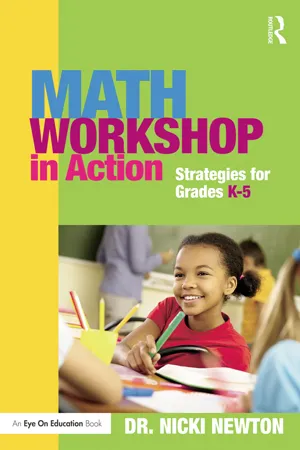
- 160 pages
- English
- ePUB (mobile friendly)
- Available on iOS & Android
eBook - ePub
About this book
Find out how Math Workshops engage students and increase learning. This practical book from bestselling author Dr. Nicki Newton explains why Math Workshops are effective and gives you step-by-step instructions for implementing and managing your own workshop.
You'll find out how to...
- create a math-rich environment;
- use anchor charts effectively;
- manage the workshop;
- begin a workshop with activities;
- lead whole-group mini-lessons;
- make workstations meaningful and engaging;
- create guided math groups;
- implement "the Share" effectively; and
- ensure balanced assessments.
Each chapter offers a variety of charts and tools that you can use in the classroom immediately, as well as reflection questions and key points. The book also features a handy Quick-Start Guide to help you as you implement your own workshop.
Frequently asked questions
Yes, you can cancel anytime from the Subscription tab in your account settings on the Perlego website. Your subscription will stay active until the end of your current billing period. Learn how to cancel your subscription.
No, books cannot be downloaded as external files, such as PDFs, for use outside of Perlego. However, you can download books within the Perlego app for offline reading on mobile or tablet. Learn more here.
Perlego offers two plans: Essential and Complete
- Essential is ideal for learners and professionals who enjoy exploring a wide range of subjects. Access the Essential Library with 800,000+ trusted titles and best-sellers across business, personal growth, and the humanities. Includes unlimited reading time and Standard Read Aloud voice.
- Complete: Perfect for advanced learners and researchers needing full, unrestricted access. Unlock 1.4M+ books across hundreds of subjects, including academic and specialized titles. The Complete Plan also includes advanced features like Premium Read Aloud and Research Assistant.
We are an online textbook subscription service, where you can get access to an entire online library for less than the price of a single book per month. With over 1 million books across 1000+ topics, we’ve got you covered! Learn more here.
Look out for the read-aloud symbol on your next book to see if you can listen to it. The read-aloud tool reads text aloud for you, highlighting the text as it is being read. You can pause it, speed it up and slow it down. Learn more here.
Yes! You can use the Perlego app on both iOS or Android devices to read anytime, anywhere — even offline. Perfect for commutes or when you’re on the go.
Please note we cannot support devices running on iOS 13 and Android 7 or earlier. Learn more about using the app.
Please note we cannot support devices running on iOS 13 and Android 7 or earlier. Learn more about using the app.
Yes, you can access Math Workshop in Action by Nicki Newton in PDF and/or ePUB format, as well as other popular books in Bildung & Bildung Allgemein. We have over one million books available in our catalogue for you to explore.
Information
1
Creating a Community of Learners in a Math-Rich Classroom

Figure 1.1 Anchor Chart: In Our Classroom
Math Workshop is about a group of children learning and working together throughout the year in a structured instructional format that has multiple spaces for individual, partner, and small-group work. Students collaborate and learn about math in a space that is invigorating, rigorous, and standards based. They look forward to working on projects, playing games, and spending quality time with their teacher. Math Workshop is meant to be part of what memories are made of. So how do you create such a space? Day by day, week by week, throughout the year, your goal is to develop students’ “productive mathematical behaviors, model mathematical thinking and foster a productive disposition” (Hunter & Anthony, 2011).
Mathematical behaviors are how people act as mathematicians. Mathematical thinking is how people engage their minds with mathematical concepts and talk about and show what they know. A productive disposition is how people see themselves as mathematicians and how motivated they are to engage with the mathematics based on their beliefs about how well they can do the math. A productive disposition includes “confidence, flexibility, perseverance, interest, creativity, appreciation, reflection and monitoring” (Merz, 2009). The first few weeks are crucial in setting the “feeling tone” (to use a Madeline Hunter phrase) for the entire year.
Week 1: Beginning the Journey
The first week is about establishing Math Workshop as a structure for teaching and learning math (see Figure 1.5). During this week, you will introduce Math Workshop in general, and then the ways of being and doing as mathematicians framed around the National Council of Teachers of Mathematics (NCTM) Mathematical Processes (2000) and the Mathematical Practices (2010). It is important to work on building a mathematical community of learners. You want your students to love learning, to love math, and to respect each other. This comes about in an intentional way, when you set out to create a community of respectful learners.
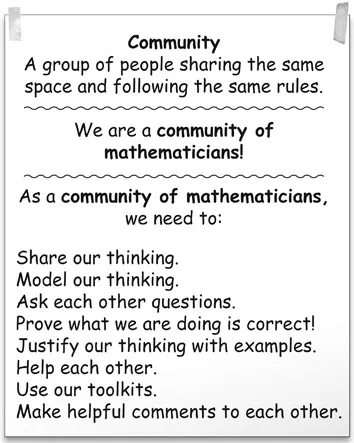
Figure 1.2 Anchor Chart: Community
During this first week, you can use mini-lessons about community that are anchored by charts to help your students to learn and then remember how the community works. You should emphasize communication and participation. Set the tone that explanation, justification, and “friendly argumentation” is what you expect in your discussions (Goos, 2004; Hunter & Anthony, 2011).
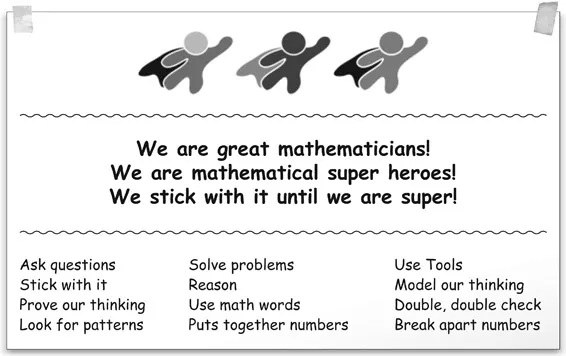
Figure 1.3 Anchor Chart on Being Great Mathematicians
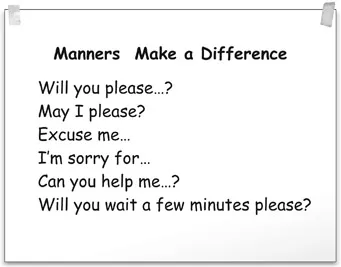
Figure 1.4 Anchor Chart: Manners Make a Difference
Your students will learn that they will be working together respectfully to learn all the math they need to learn this year. You should have a general introduction of the math—an overview of the big math goals for the year. You should emphasize learning about talking to each other about math and learning with each other. See Figures 1.1, 1.2, 1.3, 1.4, 1.5, and 1.6 for sample anchor charts that can help you set the general tone.
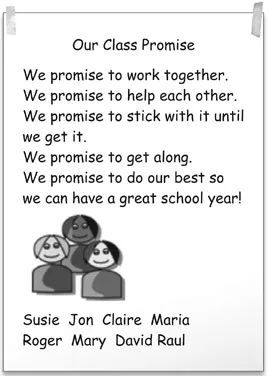
Figure 1.5 Anchor Chart: Our Class Promise
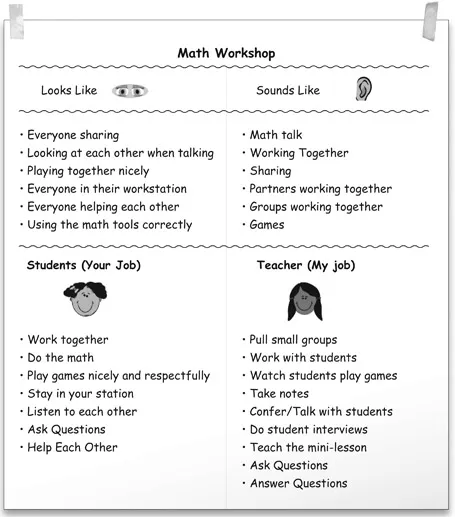
Figure 1.6 Anchor Chart: Math Workshop
Week 2: Learning to Persevere, Reason, and Talk Mathematics
Devote the second week to learning more about persevering as a mathematician (a concept as important as stamina is to reading). For example, introduce your students to problem solving. They will learn about persevering through a problem, modeling their thinking, and then explaining what they did. You should scaffold student thinking through problems with templates. You can have a class template for the problem of the day and individual templates for work in stations. Templates help students to organize themselves and address all aspects of problem solving. See the word problem template in Figure 1.7.
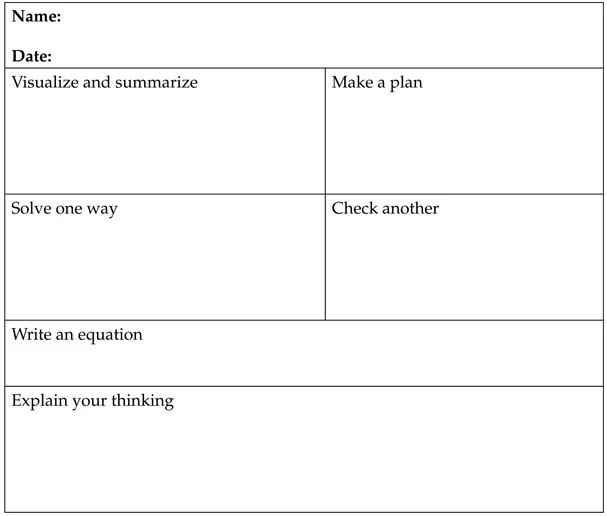
Figure 1.7 Problem Solving Template
(Newton, 2014)
During this week, spend some time on the idea of perseverance. This is one of the greatest gifts you can teach your students. They need to learn that they have to “stick with it” and “wrestle” with a problem. You need to teach this explicitly through what Dweck (2006) calls a “growth curriculum.” This is in reference to an explicit curriculum that teaches children to stick with it until they get it. You can create your own growth curriculum by having posters up and routines that talk about students’ perseverance in math. Start this discussion at the beginning of the year and continue it throughout the school year, having daily and weekly routines (see Figure 1.8). (Be sure to see my Pinterest board about growth mindset at www.pinterest.com/pin/142004194476404925/)
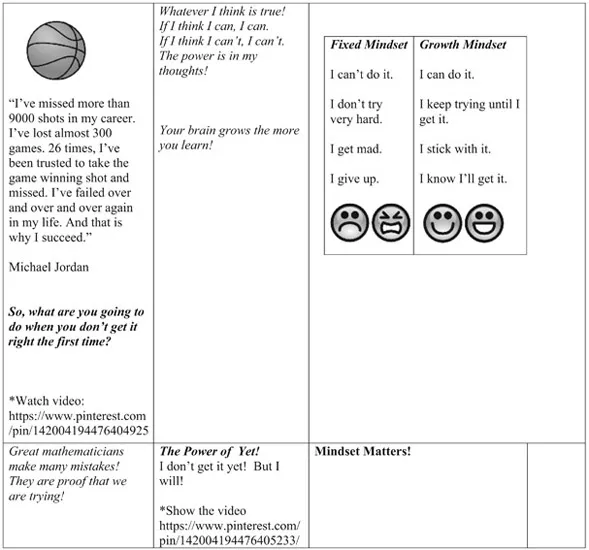
Figure 1.8 Building a Growth Mindset
(Newton, 2014)
In your teaching environment, hang posters like the one in Figure 1.8 showing Michael Jordan’s famous quote.
Next, introduce your students to reasoning. They can discuss solving different types of problems of the week. One type of problem is where your students will go from words to numbers (to decontextualize), and the other type is where they will go from numbers to words (to contextualize); see Figure 1.9. This idea of getting students to become problem posers as well as problem solvers has been around for a while; however, it has gained even more recognition in the last few years (CCSS, 2010).
Help your students begin to practice routines such as Prove It, Convince Me, and True or False? These are all reasoning routines where students have to prove their thinking, convince others that their argument makes sense, and decide whether a given problem or equation is true or false (see Figure 1.10).
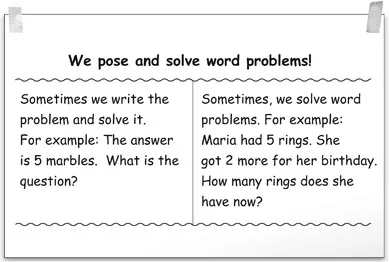
Figure 1.9 We pose and solve word problems!
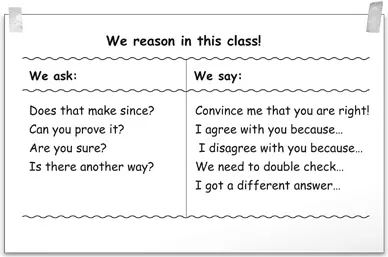
Figure 1.10 We reason in this class!
During this time, introduce your students to the “5 talk moves” (Chapin, O’Connor & Anderson, 2003); see Figure 1.11. Chapin and colleagues describe these strategies for facilitating a discussion as:
“talk moves” that support mathematical thinking, talk formats that provide different ways to organize students for conversations and ideas for creating a classroom where respect and equal access to participation are valued norms.
(Chapin, O’Connor & Anderson, 2003, p. 11)
When you directly teach your students how to engage in discussion with each other, you set up a framework for success. You can make a classroom poster, talk about it with your students, and then practice the talk moves.
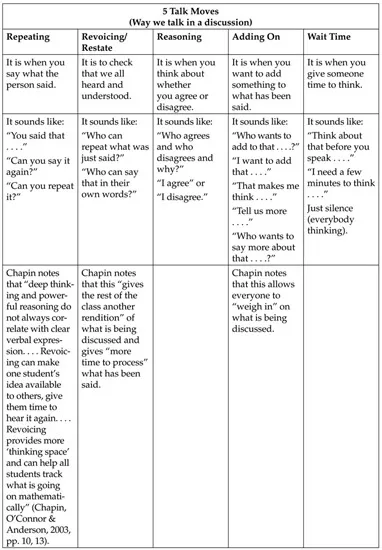
Figure 1.11 Five Talk Moves
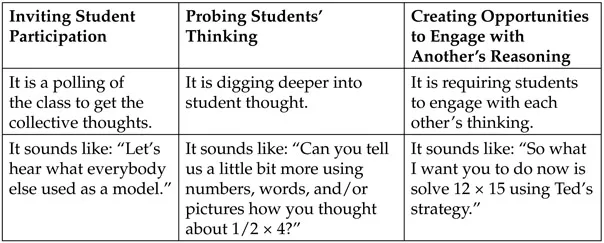
Figure 1.12 More Talk Moves
Herbel-Eisenmann, Steele, and Cirillo (cited in Cirillo, 2013) built on the talk moves of Chapin et al. (2003) and came up with what they call “teacher discourse moves” as a tool to facilitate productive classroom discussions. Figure 1.12 shows the three new twists they added to talk moves.
Kristin Edwards (www.pinterest.com/pin/19351473372809858/) has a great idea to get students talking. She puts accountable talk stems on ...
Table of contents
- Cover
- Title
- Copyright
- Dedication
- Contents
- Meet the Author
- Acknowledgments
- 1 Creating a Community of Learners in a Math-Rich Classroom
- 2 Living and Learning in a Mathematically Rich Space
- 3 Managing the Workshop
- 4 The Opening (Part I)
- 5 The Opening (Part II): Mini-Lessons
- 6 Math Workstations: Meaningful Engagement
- 7 Guided Math Groups
- 8 The Share
- 9 Balanced Assessment
- 10 Action Planning: A Quick-Start Guide
- References